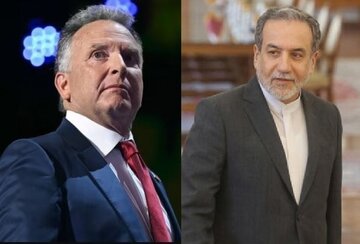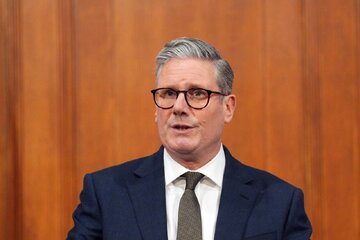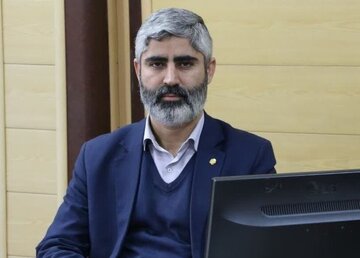Amr Moussa has become fully determined to quit his post as the long time Secretary General of the Arab League, a 22-member forum representing Arab states, and run for the upcoming presidential election in Egypt. Indeed his candidacy for Egyptian presidential election of 2011 will bring a new air to such historical event. Ignoring the possible objection of the U.S. statesmen on his nomination, Moussa will possibly make a strong bid in the vote and is to gather a team of alert political experts to plan and promote his electoral campaign. Moussa says he is to publicize his programs one by one in full detail at the most convenient time.
In an interview with Khabar Online, Amr Moussa elaborated on the problems his country is currently facing with, including Egyptian economy, politics and international pressures both on him and his country.
Before heading the Arab League, the veteran politician was Egypt's Minister of Foreign Affairs from 1991 until he was appointed as Secretary General of Arab League. Moreover on 2003, he became a member of the United Nations High Level Panel on Threats, Challenges and Change for International Peace and Security.
First give us your view on the Egyptian Revolution of January 25th and its aftermaths.
Revolution of January 25th was literally a unique event with powerful national and regional repercussions. Some of us had realized that the Arab world with its entire young people and despite all potentials was considerably beset by inertia and stagnation an instance of which was evidently clear in Egypt. The damages made to Egyptian society could lead the country to an explosion and confront us with numerous problems.
Did you think that Egyptian regime will be toppled?
No not in any way. Nobody could imagine a revolution with such extent, a revolution different from whatever events occurred in the past Egypt. As a matter of fact, it was an unprecedented revolution staged in contrast with traditional principles of Egypt. This revolution was in line with 21st century criteria and totally different from those of the 20th century. The Egyptian Revolution has changed many concepts, transformed the future of political horizon in Egypt. Moreover it is expected to have an immediate impact on the future development in the Arab world and generally the Middle East. The revolution in Egypt was fomented in accordance with the notion of Domino theory in politics.[*] However the conditions of such transitions are not necessarily the same and are not supposed to lead to same consequences. They may even lead to a development in the way of ruling the Arabian countries, their regimes and their political path.
We must appreciate Tunisian Revolution which ignited a great energetic movement in the region and swept through the entire Arabian society. However undoubtedly it is Egyptian uprising which will make a strong impact on the whole Arabian society. Although it is true that the Revolution of January 25th lacks a leader and guiding current, it enjoys a huge popular movement which for people stands above everything.
Strong concerns have been expressed that the Egyptian Revolution may be stolen by certain political and religious factions, do you have the same concerns?
I see the reality from a different perspective. I believe Egypt after Revolution of January 25th will never be the same as before. Those who fear that the revolution will be stolen, will regress to the former state or will be diverted to other tendencies have forgotten this fact which is a crystal clear rule of all revolutions that there is no way to turn back or restore the former regime. So things will be proceeded in the way of improvement. We have insisted that the movement of the Egyptian people is heading to democracy, transparency, the rule of law and perfect reforms. Against all odds, this revolution will definitely pursue its path.
So do you reject the possibility of stealing the revolution and believe that no deviant political current can own it?
No I don't deny efforts made to steal the revolution. It's a political game and everything is possible. But I also acknowledge that the uprising was held by people themselves, not their representatives or political factions. All people came to streets, staged a revolution and called for development. Now the time has come for Egypt to restore itself and change its old, stagnant mood as a crone like country. This way, the revolution cannot be stolen.
It is being said that Muslim Brotherhood has taken the best advantage of January 25th Revolution and for this reason from the beginning it took steps to set up a new political party.
All political factions have the right to set up parties in their own names, express their ideas and make proposals for resolving the problems of Egypt, which will be open to dispute. The nation in its own turn has the right to know what these political factions say and what proposal they make. The main objective is to establish modern Egypt, a democratic Egypt. Democracy means any citizen and any faction in Egypt should be provided with the opportunity for expressing his/her or its ideas. All political lines will be open to dispute to secure democratic means for a modern plural society.
Many believe that the removal of Egyptian political parties by the former regime and the collapse of the National Democratic Party [founded by the then President Anwar El Sadat in 1978] which happened recently has prepared the ground for Muslim Brotherhood members to enjoy the best chance for taking the control of the parliament, since at the moment they are the only political faction in the country which has a special status in Egyptian society. This issue has been raised several times by the U.S. officials. Do you have the same opinion?
I believe at the beginning all political moves in Egypt should be aimed at holding the presidential election not the parliamentary election. The Supreme Council of the Armed Forces has also adopted practical measures, for example it has amended the constitution, has created a peaceful climate and has made replacements at the top levels of the government. However perhaps the most significant development is the amendment of the constitution, it means for providing the ground for parliamentary and presidential election.
Immediately after the transitional stage, when the country is being run by the Supreme Council of the Armed Forces comes to an end, the time will be convenient for conducting the presidential election based on the amended constitution. Then I believe the president elect must gather the experts and the top representatives of syndicates and different professions including engineers, doctors, farmers, workers as well as social groups including women, the youth and others to form a team for a revision of the constitution.
It means that the next president will form a 200 or 250-member council tasked with a meticulous revision of the constitution and will make it the basic and principal backbone of the new system. Later the president will be able to hold parliamentary election straight away based on the new constitution.
Why do you stress on amending the constitution as it has been already amended after the collapse of the former regime? Don't you think it will cause people to get bored and trigger new protests?
No, not at all, it's absolutely necessary for us to have a new constitution. We are living in the 21st century and need a new constitution which can meet the demands of people who are living in this age. We need a constitution to separate the pillars of power and define the authority of the president, prime minister and parliament members, and set limits for their relevant tenures. I suppose the presidential term in Egypt should last five years. It seems that the president should have enough time to implement his plans for developing the country and reach to a level of achievement. As a result, I would say that the Constitution should not be limited to articles and clauses. The Constitution should turn into the soul and framework of society, describe its objectives and legalize social moves.
Do you think of running for the next presidential election?
Regardless of who will be elected as the next president of Egypt, I believe he should take office just for one term. Then we should discuss on the number of years for any presidential term: four, five or six years. Nonetheless, all reforms and amendments should be made in the same period and the president should lead the country toward stability and improvement of the affairs. Then from 2015 on, we will be ready for setting a two-term presidency.
What threats do you predict would be involved in the next parliamentary election of Egypt which is to be held before the presidential election?
I don't think a serious threat will be involved. Yes there are many differences between political groups and factions, but it doesn't necessarily mean they will be in conflict with each other. I think time should be given to the parties because they are not ready yet. The implementation of democracy and parliamentarianism demands fully equipped parties which would be able to participate at a real competition. They should be given the opportunity to act, introduce and confirm their candidates, receive votes and take seats in the parliament. If they are given a convenient rationale time, an opportunity to find themselves and get ready to run for the election, I think at the moment, unlike past occasions we can expect to see good campaigns for the parliamentary election. It is helped by a permanent constitution which is trusted by political parties, factions and candidates to move ahead their plans.
Without addressing the peripheral issues, we want to know your position right now. Will you announce your candidacy for the upcoming Egyptian presidential election or not?
I'm ready to run for the upcoming election and I feel it's somehow necessary for me and I feel responsible to stand for the election. Why shouldn't I run for that when I realize I can be elected as president? Many young people, boys and girls ask me to campaign for the presidential election. At the moment I'm arranging my programs to announce candidacy at the convenient time before the election. For the upcoming poll, doors are open to anyone, for the time being everyone can really participate at a free election. Any eligible person should participate at the election, in this way we would have a great competition without any external influence. It is exactly what the revolution in Egypt tries to materialize.
You definitely know that the Americans prefer you avoid running for the presidential election.
This is not to be the presidential election in the United States but in Egypt, and it's going to be held without any foreign interference. Yes I've heard from various persons quoting the U.S. statesmen that Moussa is not eligible for the post of Egypt's President. But at first we should bear in mind that the upcoming election should be above all free and healthy. It's also necessary for the Americans to accept the results of the election, even if it would lead to the victory of the Muslim Brotherhood candidate. Second, there is no chance for foreign meddling in the Egypt's presidential election, whether for the Americans or non-Americans. Egyptian nation knows better that who should be elected as the president.
What's your overall plan for the presidential campaign?
Perhaps it's correct that people expect me to propose an inclusive and perfect program for the presidential election. But in my view at the moment the system of Egypt should be a presidential not parliamentary. It is necessary for the system to be revised and developed into a democratic system which enables us to run the country based on a new constitution and within the framework of a state which would rule for 10 years. In the meantime it would facilitate the path for transition to a parliamentary system. In my view, in the current situation is better that a presidential system with particular limitations on the president's power governs the country transparently and democratically. It is significant because in this transitional stage the country should be restored, return to the correct path and reach stability.
For these reasons a powerful president would be more helpful. The president should have a transparent and strategic view for the future of Egypt and he/she would be able to express such view in his/her election program, a program corresponding with national criteria defined by national organizations. The key point is that the president should lead a true development. This stage belongs to analysts and experts not trustees. Those who went after building confidence and made a mess in the affairs of the country are the prime culprits of causing the crisis. I also defend the enactment of a new constitution based on the model which I proposed...
What about your election plan?
I have taken some issues especially into consideration. They are not limited to nowadays or after the revolution of January 25, these are issues which I have argued over them for a long time and discussed many economy, sociology, and sciences experts about them. I have been certain that the backwardness of Egypt in several aspects is rooted in the social structure which has also affected our economy. Moreover we have suffered serious problems in terms of education and healthcare. For this reason I believe that reforms should take place.
I'm so hopeful about the people of Egypt. Although we are pressed by the time limits, but since they are resolute in their aims, they will further the reforms. In terms of education, the country is not in an appropriate condition. Our young people deserve to receive a much more better education. Due to their earnestness, I'm sure they can shortcut and traverse a distance in five years instead of ten years.
What's your initiative for weathering the economic crisis in your country?
At the beginning the 1990s, we discussed a lot about economic reforms within the framework of international system. At that time the cold war had just came to an end and the capitalistic order had begun to dominate the world. Economic systems were moving to become independent and privatization had been set at the agenda of global economy as the first priority. On the other hand the International Monetary Fund (IMF) which oversees the global financial systems and the World Bank had already begun to play more central roles.
We had a view on the economy at that time which was not compatible with that of the Egyptian society. Egypt was a developing country and we could not perfectly put the capitalist economy theory into practice. Unfortunately at that time the officials of the country did not care about that situation and did not realize the social realities. So, later we witnessed the consequences of their negligence and the people paid the price. The economic policy of that time failed and from the beginning of 2000 up to 2010 powerful traders emerged in Egypt whose reach was unprecedented. The economy was drastically and disproportionately transformed. From one hand a limited number of persons who called themselves as the directors of private companies became strongly rich, and from the other those who constitute the majority of population became extremely poor.
We should set an economic initiative on the agenda which is appropriate for all layers of the society. We should seriously discuss on economic problems. Here I cannot elaborate further on the issue. However we should adopt an approach to reduce the poverty and hunger rate. It's not helpful at all to be proud of an economic growth whose impact is not felt by people. The major portion of our society does not feel the economic growth and we can say that the country is suffering from an economic disorder which must be treated.
On the whole I believe Egyptian economy should move equally toward two axes of free market and social justice.
What's your view on Egyptian nuclear program?
I was worried that the managers of some private companies could succeed in halting Egypt's nuclear program for the reasons which I don't want to mention. I strongly insist that nuclear plants must be built and become operational. As an Egyptian citizen, I protest halting our nuclear projects, but fortunately god helped us and now a location is set for establishing a nuclear plant. God willing it is to be built and I hope the related measures are taken up to the end.
Is it possible that Egypt will be put under foreign pressure?
Definitely, as we are talking about the peaceful nuclear activity under the terms of the International Atomic Energy Agency (IAEA) in particular, , I know what pressures are involved regarding the contradictory global interests, but I don't understand why should we automatically back off. It is entirely relevant to our policies and positions. If we take up a firm stand, we can achieve this technology since we have the right to possess nuclear technology. The important issue is being hopeful to the future of Egypt.
Nonetheless we are not to start from scratch, we have power plants built with the help of Argentinean experts in 1990s. The issue at stake is developing their capacities to produce energy. We should back the scientists who research and work in this field. We must initiate university courses, train our manpower and cooperate with important universities not only in the West but those in the East, for example universities in Japan, Korea, India and so on. They charge us less than the universities in the other continents.
How do you see the prospect for Egypt's foreign relations?
We should restore our relations with all countries throughout the world. In past our relations with several countries including Iran, Syria, Lebanon and others had become strained. On the other hand we extremely upgraded our ties with some other states including Israel, as Israelis took the most advantage of us. Now the time has come to open a new chapter in relations with all countries among them Iran.
[*] Domino theory, also called Domino Effect, theory in U.S. foreign policy after World War II stating that the "fall" of a noncommunist state to communism would precipitate the fall of noncommunist governments in neighboring states. The theory was first proposed by President Harry S. Truman to justify sending military aid to Greece and Turkey in the 1940s, but it became popular in the 1950s when President Dwight D. Eisenhower applied it to Southeast Asia, especially South Vietnam. The domino theory was one of the main arguments used in the Kennedy and Johnson administrations during the 1960s to justify increasing American military involvement in the Vietnam War. (Britannica)












نظر شما